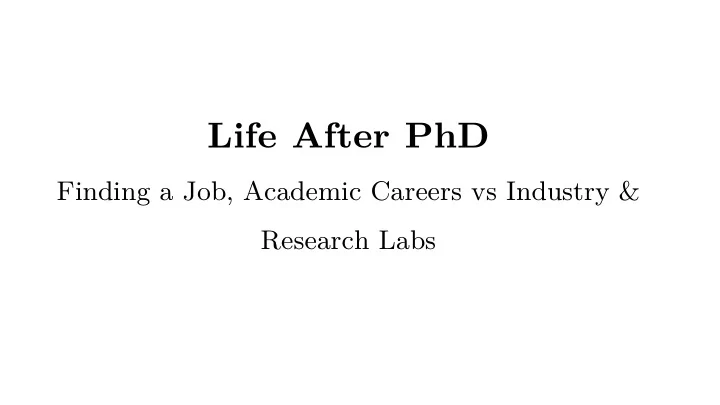

Life After PhD Finding a Job, Academic Careers vs Industry & Research Labs
Outline • Introduction • Choices (Academia vs Industry) • Academia • Industry • Conclusion
What are planning to do after your PhD?
Academia vs Industry
Academia vs Industry Source: https://80000hours.org/career-reviews/computer-science-phd/
Academia vs Industry Academia Industry • Freedom • High salary • Intellectual autonomy • Direct impact on real-world • Flexible hours problems • Teaching • Less overhead • Stability • Teamwork • Fund Managing • Constrained and monotone
Keep In Mind Your priorities Your interests Your strength Think long-term Personality
Your Decision Only YOU know what is best for YOU
Academia
Academia Jobs • Non-tenure track • Tenure track
Academia Jobs • Lecturer/Teaching Professor • Postdoctoral Researcher • Professor • Other
Lecturer/Teaching Professor • Generally non-tenure track • Teaching position • No research obligation
Postdoctoral Researcher • Non-tenure track • Continuation of researcher’s training • Pathway to be an independent researcher • Can do multiple postdocs
Professor • Tenure track • Assistant Professor -> Associate Professor -> Professor
Professor • Tenure track • Assistant Professor -> Associate Professor -> Professor
Professor • Tenure track • Assistant Professor -> Associate Professor -> Professor
Professor - Responsibilities Manage funding Conduct research Collaborate Publish paper Mentor students Other Services Teaching
Other Adjunct Professor • Part-time/non-permanent faculty • Can be employed elsewhere • Lack of benefits
Application Steps • Initial Application • Request for transcripts and references • Interview • Offer
Phase 1 & 2 - Things to Remember • Understanding employee’s expectation • No typographical or grammatical errors • Distinguish your application • Brief letter of transmittal
Phase 1 & 2 - Tips Do NOT procrastinate Strong Reference Up-to-date CV Start working on seminar if you are in phase 2!
Phase 3: The Interview • A series of visits • Dress like you belong • Lunch/Dinner with host • Future research plan?
Seminar Tips • Don’t be too technical & wordy • Don’t use too much color • Practice beforehand • Manage time carefully • Visit the seminar room beforehand
Phase 3 - Your End • You are also buying (Learn about the place as much possible) • Negotiation You get what you negotiate, not what you deserve • Follow-up Letter
Phase 4 – The Worst Case • Don’t feel too bad • Send response mail
Phase 4 – The Best Case CONGRATULATIONS Do NOT immediately say YES!
Negotiation • Startup Package • Salary • Moving expenses • Health care • Appointments of spouses or partners • Other specific issues Be Honest & Play Fair
Multiple Best Cases – Things to Consider Collaboration Reputation Startup Package Salary Opportunities Your overall impression Geography Teaching Load
Industry
What industry includes • Starting your own company • Work in a research lab • Work in a company
Start-up your own company If you think you have a novel idea, why not start your own company? It is beneficial if your idea is part of your conducted research
Work in a Research Lab It is a hybrid model between academia and Industry Google is one of the biggest companies that offer such opportunities
Industry Pays More! Source: https://www.sciencemag.org/careers/2017/07/what-comes-after-phd-check-out-data#
Impact Academia: Indirect Impact: the ideas influence other people. Industry: direct, immediate impact. New products: drugs, phone, software.
Finding a Job To find a job you have to focus your energy. You can’t just apply to every single job you find online.
Disadvantages compared to MSc and BSc graduates • You are not a fresh (and young) MSc or BSc graduate ready to be groomed by the corporate philosophy. • You have little relevant industry experience. And because of your age and qualifications, you are a bit expensive.
Advantages compared to MSc and BSc graduates • Your research makes you unique and irreplaceable in the eyes of employers • The path to a PhD has cultivated abilities that few people have the chance. (Teaching, Research) • The connections you have created while pursuing your PhD might help you get a better job • You have learned to follow novel research which will always place you a step ahead • Your presentation skills are better
What to Consider What kind of job you want? What are your weaknesses? What skills can you leverage? Can you use other people to achieve your goals?
Useful Tips to Get an Industry Job Develop networking during your grad life Let everybody know you are job hunting Use LinkedIn to contact people with the same kind of job you want Contact both recruiters and employees
Useful Tips to Get an Industry Job Keep searching even if you get invited for interviews Do not think that you will be treated special if you have a PhD When they turn you down, try harder!
Finding an Industry Job Stages
Questions?
Recommend
More recommend